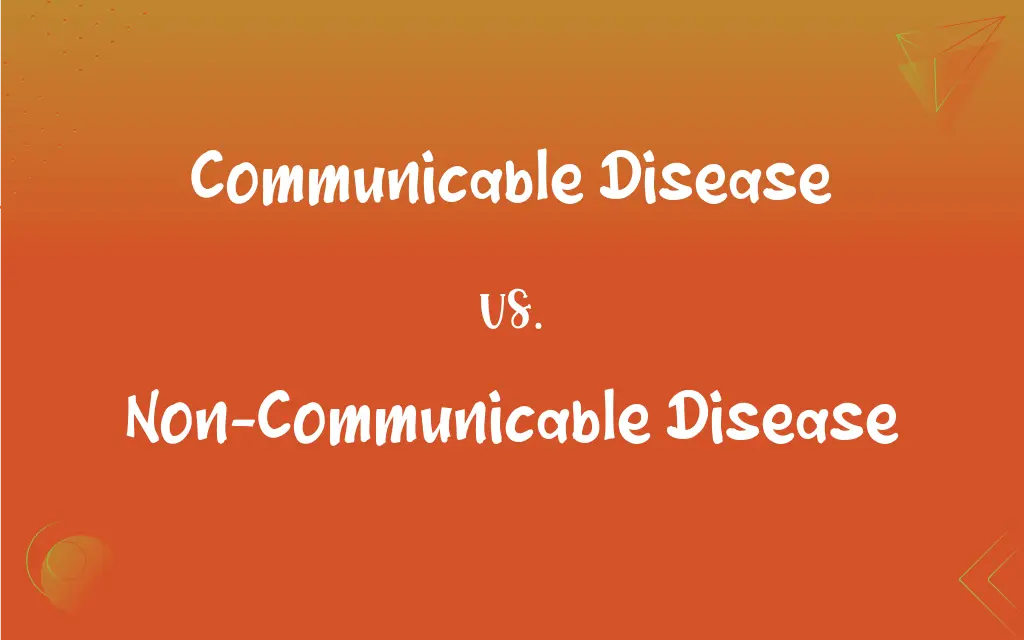Communicable Disease vs. Non-Communicable Disease: What's the Difference?
Edited by Janet White || By Harlon Moss || Updated on October 28, 2023
Communicable diseases spread between people, while non-communicable diseases do not.

Key Differences
Communicable diseases are caused by infectious agents such as bacteria, viruses, or parasites and can be spread directly or indirectly between individuals. Non-communicable diseases, also known as chronic diseases, are not infectious and cannot be transmitted from one person to another.
While communicable diseases often present with acute symptoms and can lead to epidemics, non-communicable diseases typically develop slowly and last for extended periods, often leading to long-term health impacts.
Prevention of communicable diseases often involves hygiene, vaccinations, and avoiding contact with infected individuals. In contrast, preventing non-communicable diseases generally focuses on lifestyle factors such as diet, exercise, and avoiding tobacco and excessive alcohol.
Treatment for communicable diseases usually includes medications such as antibiotics or antivirals to target the infectious agent. Non-communicable diseases often require long-term management, including medication, lifestyle changes, and sometimes surgery.
Public health measures for controlling communicable diseases include quarantine and sanitation efforts. For non-communicable diseases, public health focuses on education, health screenings, and policies to promote healthy environments.
ADVERTISEMENT
Comparison Chart
Cause
Bacteria, viruses, parasites.
Not caused by infectious agents.
Transmission
Direct or indirect between people.
Cannot be transmitted between people.
Symptoms and Course
Often acute; can lead to epidemics.
Usually chronic; long-term health impacts.
Prevention Strategies
Hygiene, vaccinations, avoiding infected individuals.
Lifestyle changes, health education.
Treatment Approach
Targeting infectious agent with medications.
Long-term management, lifestyle changes, medication.
ADVERTISEMENT
Communicable Disease and Non-Communicable Disease Definitions
Communicable Disease
Spread by infectious agents.
The flu is a common communicable disease.
Non-Communicable Disease
Often related to genetics.
Hypertension can be a hereditary non-communicable disease.
Communicable Disease
Transmitted between people.
Measles is a highly communicable disease.
Non-Communicable Disease
Chronic and not infectious.
Diabetes is a widespread non-communicable disease.
Communicable Disease
Often requires quarantine.
During the outbreak, patients with the communicable disease were quarantined.
Non-Communicable Disease
Managed with lifestyle changes.
Heart disease, a non-communicable disease, can be managed with diet and exercise.
Communicable Disease
Can cause epidemics.
HIV/AIDS is a globally significant communicable disease.
Non-Communicable Disease
Not spread person-to-person.
Asthma, a non-communicable disease, cannot be caught from others.
Communicable Disease
Includes bacterial infections.
Tuberculosis is a serious communicable disease.
Non-Communicable Disease
Includes lifestyle diseases.
Obesity is a common non-communicable disease.
FAQs
Are non-communicable diseases contagious?
No, they cannot be transmitted between people.
Can vaccines prevent communicable diseases?
Yes, many are preventable by vaccines.
Can non-communicable diseases be inherited?
Yes, some have genetic factors.
Do non-communicable diseases require lifelong management?
Often, they require ongoing care.
Do lifestyle choices affect non-communicable diseases?
Yes, factors like diet and exercise are important.
Do communicable diseases always show immediate symptoms?
Not always; some have incubation periods.
Are all non-communicable diseases genetic?
Not all; lifestyle and environment also play roles.
Can good hygiene prevent communicable diseases?
Yes, it's a key preventive measure.
Can communicable diseases lead to epidemics?
Yes, some have the potential to cause outbreaks.
Are non-communicable diseases always chronic?
Mostly, but severity and course can vary.
Can exercise reduce the risk of non-communicable diseases?
Yes, it's beneficial for prevention and management.
What causes communicable diseases?
Infectious agents like viruses and bacteria.
How are communicable diseases spread?
Through direct or indirect contact.
Does smoking increase the risk of non-communicable diseases?
Yes, it's a major risk factor for many.
Are heart diseases non-communicable?
Yes, they are not infectious.
Are antibiotics effective against communicable diseases?
Yes, but only for bacterial infections.
Is isolation effective in controlling communicable diseases?
Yes, it can help prevent spread.
Is handwashing effective against communicable diseases?
Yes, it's a simple yet effective prevention.
Is cancer a non-communicable disease?
Yes, it's not caused by infectious agents.
Can communicable diseases be asymptomatic?
Yes, some people may not show symptoms.
About Author
Written by
Harlon MossHarlon is a seasoned quality moderator and accomplished content writer for Difference Wiki. An alumnus of the prestigious University of California, he earned his degree in Computer Science. Leveraging his academic background, Harlon brings a meticulous and informed perspective to his work, ensuring content accuracy and excellence.
Edited by
Janet WhiteJanet White has been an esteemed writer and blogger for Difference Wiki. Holding a Master's degree in Science and Medical Journalism from the prestigious Boston University, she has consistently demonstrated her expertise and passion for her field. When she's not immersed in her work, Janet relishes her time exercising, delving into a good book, and cherishing moments with friends and family.































































